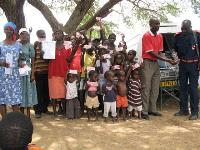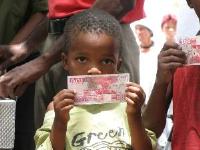

|
GROWING
SUPPORT FOR BI WORLWIDE
|
| Whether the APF dividend should be considered as a basic income is a question of debate. Some people will argue that it is not, because the level of the dividend varies depending on the earnings of the APF, and the dividend is not enough to satisfy all basic living costs. But most advocates of BI do regard it as the first real example of a BI. |
It satisfies the widely used definition of BIEN, the Basic Income Earth Network: "A basic income is an income unconditionally granted to all on an individual basis, without means test or work requirement."
The yearly distribution of the dividend since 1982 has reduced poverty and the inequality of the distribution of income in Alaska. For a more detailed analysis, see: Scott Goldsmith - The Alaska Permanent Fund Dividend: An Experiment in Wealth Distribution
More information:
Website Alaska Permanent
Fund
Alaska
Permanent Fund - Wikipedia
Brazil is the first country in the world that has passed a law on basic income. This law (n. 10.835/2004) was approved by the Brazilian National Congress in 2003 and sanctioned by President Luiz Inácio Lula da Silva on January 8, 2004. It establishes the right to a Citizen’s Basic Income, which will gradually be implemented.
The law came into being thanks to the ceaseless efforts of the Brazilian senator Eduardo Matarazzo Suplicy. Eduardo Suplicy is one of the most inspiring advocates of basic income. He is giving lectures all over the world to share his conviction:

"If we really want to eradicate absolute poverty, provide dignity and freedom to all and build a civilised and just society, a common sense solution would be to institute a basic income." |
Currently he is working on a law to earmark funds, such as revenues from oil, to finance the gradual introduction of a basic income in Brazil. Suplicy often refers to the Alaska Permanent Fund dividend as an example.
More information about basic income in Brazil: lecture Eduardo Suplicy
Basic income project in Quantiga Velho
The non-governmental Brazilian organisation ReCivitas has started a privately funded basic income pilot project in Quantiga Velho, a small community about 30 km from Sao Paulo. All of the about 100 members of the community are entitled to a monthly basic income of 30 Reais (at the start of the project this was about 17 US Dollars or 11.5 Euros). In the beginning, October 2008, people were distrustful and only 27 agreed to receive the BI. In October2010 the number of people receiving 30 Reais each month has gone up to 77. For more information: website ReCivitas.
A much bigger pilot project was initiated by the Basic Income Grant (BIG) Coalition in Namibia . The BIG Coalition consists of five large umbrella bodies in Namibia: the Council of Churches (CCN), the National Union of Namibian Workers (NUNW), the Namibian NGO Forum (Nangof), the National Youth Council (NYC) and the Namibian Network of AIDS Service Organisations (Nananso).
This basic income project started in January 2008 as a two-year pilot to test a BI in practice. The coalition hoped that if the results of the project were positive, the Namibian government would be persuaded to introduce a national BI in Namibia. The pilot project has successfully run for two years and the results have exceeded expectations.


first payout in Otjivero-Omitara
The pilot was conducted in Otjivero-Omitara, a low-income rural area about 100 kilometres east of Windhoek. A total of 930 inhabitants received a monthly basic income of 100 Namibian Dollars each, which equals 12.4 US Dollars or 8.6 Euros at the average exchange rates of 2008 and 2009.
The final results have not been published yet but the figures in the
Assessment Report of April 2009 about the first year of the project are
extremely positive. The percentage of underweight children dropped from
42% to 10% and dropout rates at the school fell from 40% to almost 0%.
One of the other most important findings was that the rate of those engaged
in income generating activities (above the age of 15) increased from 44%
to 55%. In particular, the introduction of the BI in Otjivero-Omitara
led to an increase in small businesses, such as brick-making, baking of
bread and dress-making. The BIG enabled people to make the necessary investments
for their businesses. Furthermore, it increased the buying power of the
inhabitants, thereby creating a market for the products of the new businesses.
This increase in employment contradicts the idea of critics that an unconditional
BI has a negative effect on work motivation.
The two-year period of the pilot project has ended at the end of 2009. Despite the positive results the Namibian government has thus far rejected the introduction of a national BI in Namibia. The BIG Coalition continues with its efforts to persuade the government that a BI is the best way to fight poverty in Namibia. In the mean time, the inhabitants of Otjivero - Omitara will receive a 'bridging income' of 80 Namibian Dollars for the next two years.
More information:
BIG Coalition website
One
year BIG Pilot Assessment Report, April 2009
In 2011 two pilot schemes have started in India, one supported by the Self-Employed Women's Association (SEWA), a well-known trade union for women who earn a low income through their own labour or small businesses. In eight villages the pilot provides all adults with an unconditional payment of 200 Rupees a month and each child under the age of 14 with 100 Rupees a month. These payments represent about 40% of the bare subsistence level. The pilot is intended to run for 12 months.
The other pilot is supported by the Delhi Government. It gives households a choice between continuing to receive food rations in an existing scheme or taking a monthly cash transfer instead. Many have opted for the cash.
As of this date (August 2011) there are no research results available yet on the pilot schemes.
More information on Basic Income News.
For more information about BI debates and developments around the world, the best resources are the newsletters of BIEN and USBIG, as well as the congress and discussion papers on the websites of both networks, and the Basic Income News website: